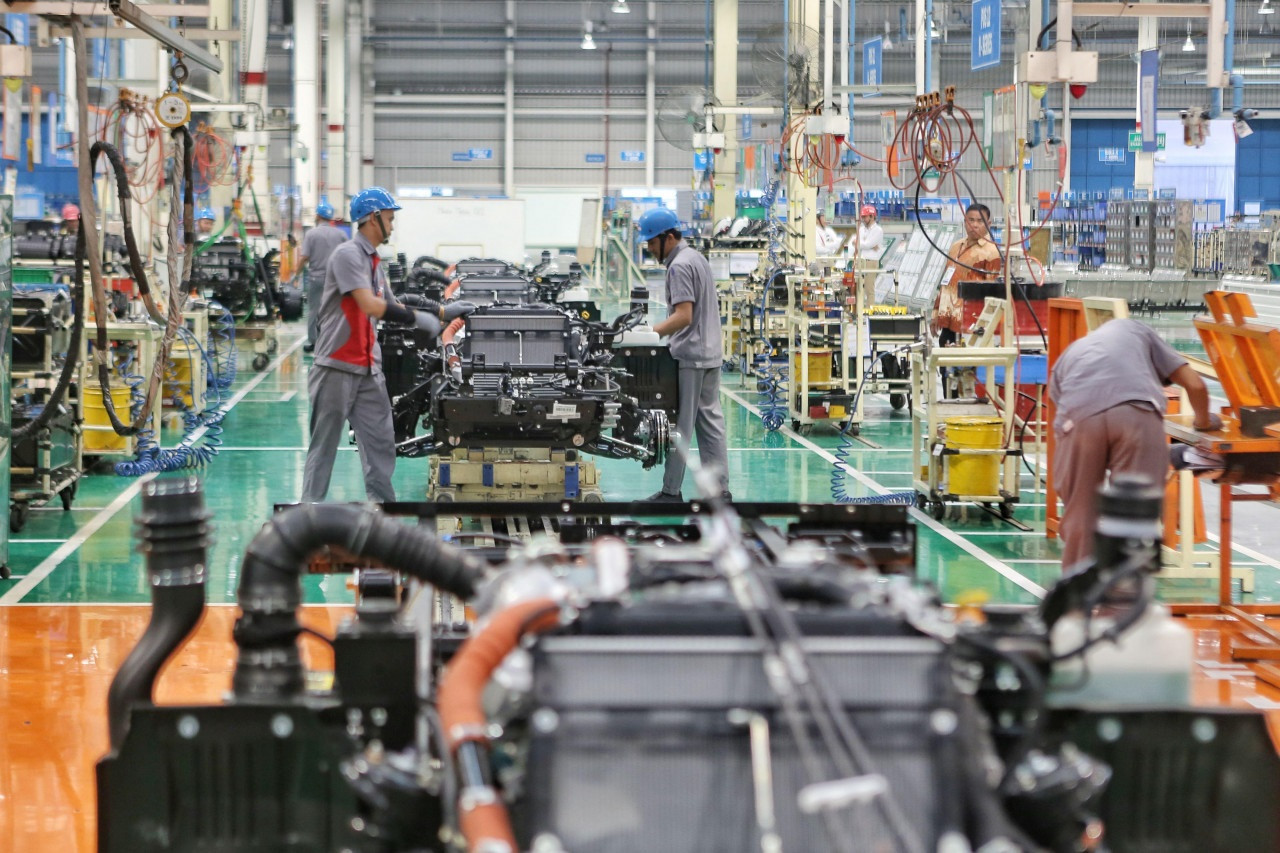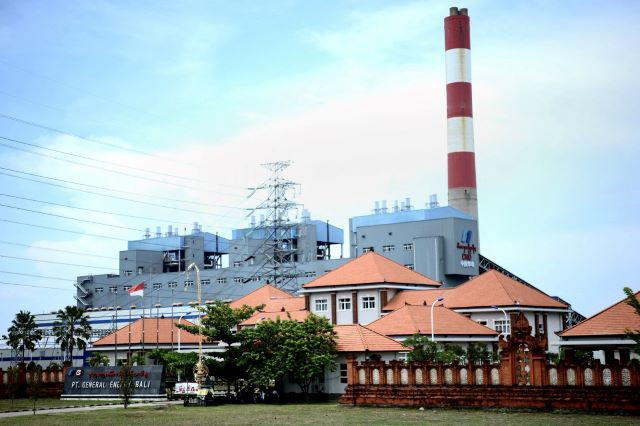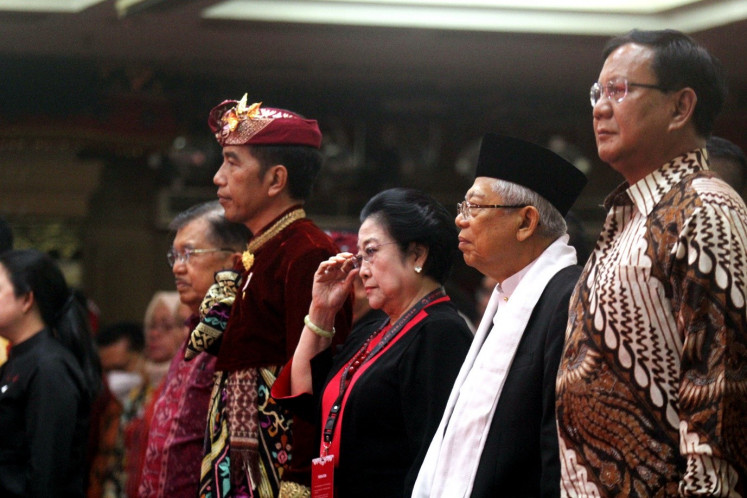RI manufacturing PMI hits 10-year high
Indonesia's manufacturing Purchasing Managers' Index (PMI) rose to a record-high at 53.2 in March, up by 2.3 points from February. The rise was driven by strong growth in new orders and output.
Change Size

I
ndonesia’s factory activity rose to its highest level in nearly 10 years in March as businesses felt a surge in new orders and output amid an economic recovery.
Business consultancy IHS Markit wrote in a Thursday statement that Indonesia’s manufacturing Purchasing Managers’ Index (PMI) stood at 53.2 in March, the highest reading since the company started measuring Indonesia’s PMI in April 2011.
The March figure marked a rebound by 2.3 points after a slowdown in February. The second-highest PMI score Indonesia achieved was in June and July 2014.
Read also: Indonesian manufacturing slows in February
The PMI, a gauge of the sector based on a monthly survey of roughly 400 manufacturers, still stood above the 50-point threshold, which signaled a sustained improvement in business conditions since November last year. A reading below 50 suggests a contraction.
“The Indonesian manufacturing sector ended the first quarter of the year on a high, with firms ramping up production in response to the strongest influx of new orders in the decade-long survey so far,” said IHS Markit economics director Andrew Harker in the statement.
“These positive results add to hopes that the sector is on a fast upward trajectory, with the obvious caveat that the COVID-19 pandemic could hit back at any time.”
The rise in the PMI followed the optimism among two-thirds of the surveyed manufacturers seen in February that output was expected to rise over the next year. IHS Markit reported that business confidence hit a 50-month high.
Manufacturing activity generally expanded across Asia, as China, South Korea, Japan, Taiwan and Vietnam saw their PMIs stay above 50 in March, even though the former two countries’ PMIs shrunk compared with February. Thailand’s and Malaysia’s PMIs were below 50.
Read also: Asia's factory recovery picks up but cost pressures emerge
For this year, the Industry Ministry has projected 4 percent year-on-year (yoy) growth in the manufacturing sector, the largest contributor to the country’s gross domestic product (GDP).
The government expects the overall GDP to grow between 4.5 and 5.3 percent in 2021, reversing the 2.07 percent contraction last year, in line with the latest forecasts from international institutions.
IHS Markit also reported that manufacturers stopped laying off workers for the first time in a year as the growing new orders put pressure on operating capacity. Companies also continued to increase production for five successive months.
“Signs of pressure on capacity meant that employment stabilized in March, and if trends in workloads remain positive we can expect outright employment growth in the near future.”
The COVID-19 pandemic led to an 8.93 percent yoy decline to 17.48 million workers in the manufacturing sector. The sector, which has the third-largest share of the workforce, recorded the most severe reduction at 1.3 percentage points to 13.61 percent in terms of share of the workforce.
While the PMI rose to a record high, manufacturers still faced rising input costs and delays in delivery due to shortages of raw materials, shipping delays and poor weather conditions.
Export-oriented manufacturers also still grappled with declines in export orders for the 16th consecutive month, although it was the least severe since November.
Read also: No severe disruption to Indonesia trade from Suez backlog, but shipping concerns loom
However, Indonesia actually booked a 9 percent annual growth to US$12.15 billion in exports of manufactured goods in February, according to Statistics Indonesia (BPS).
World Bank chief economist Aaditya Mattoo said on March 25 that while Indonesia’s overall exports had grown, the country had not taken advantage of the rebound in global trade, especially in manufactured goods like electronics.
“The ability to take advantage of manufacturing, it is out of the global value chain, not nearly as integrated as Vietnam. It has benefited from the revival in commodity prices, not so much from [manufacturing],” Mattoo told The Jakarta Post in a video interview.
Read also: World Bank holds Indonesia’s GDP growth forecast for 2021
Industry Minister Agus Gumiwang Kartasasmita said last month’s rise in manufacturing activities was driven in part by the slashed luxury goods sales tax (PPnBM) on certain cars for a three-month period starting on March 1 to boost consumer spending.
“This is proven to have boosted confidence among industry players and people’s purchasing power,” Agus said.
Car production was still down by 26.25 percent yoy to 76,723 in February, according to data from the Indonesian Automakers Association. Domestic car sales were also still down by 38.22 percent yoy to 49,202.
Shinta Kamdani, the deputy chairwoman of the Indonesian Chamber of Commerce and Industry (Kadin), said the upcoming Ramadan and Idul Fitri holiday provided an opportunity for manufacturers to increase production in the hope of raising revenue.
“We hope there will be other non-consumer spending drivers, such as pandemic handling, normalizing economic activities, the implementation of the Jobs Creation Law, an export boost and investment that can trigger a rise in productive activities after Idul Fitri, so economic growth does not shrink again and stays on the recovery trajectory,” Shinta told the Post via text message on Thursday.









